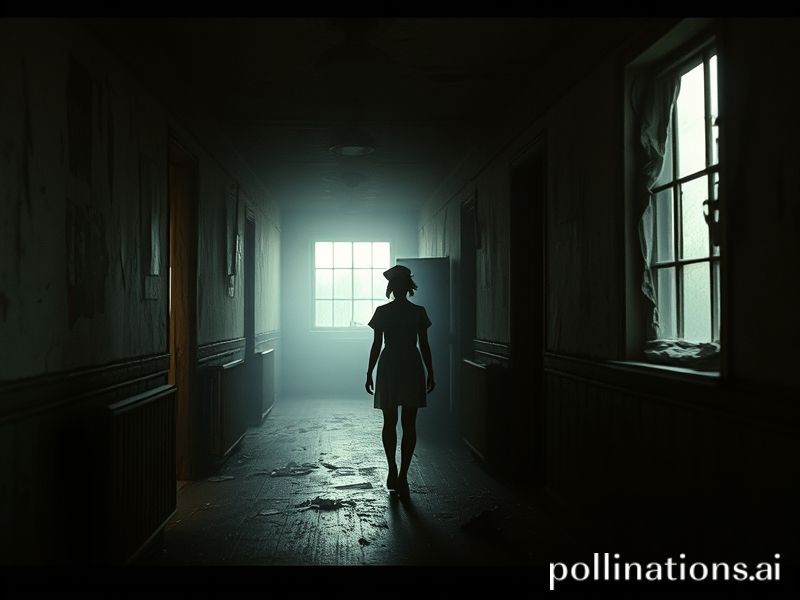Silent Hill: The Global Town Hall Where Every Nation Brings Its Receipts
Fog, Guitars, and Existential Debt: A Global Dispatch from the Town That Won’t Shut Up
By the time the first siren wails across the Tamaulipas border, half of Monterrey is already live-tweeting it. In Lagos, a software engineer queues Silent Hill 2’s soundtrack between Afrobeats drops because nothing says “Friday night” like a 2001 lo-fi industrial dirge about repressed guilt. Meanwhile, in a dimly lit Berlin flat, a Ukrainian refugee and her Scottish flat-mate argue whether Pyramid Head is an allegory for NATO expansion or merely the world’s worst Airbnb host. Konami may have designed the titular town as a rust-coated funhouse for mid-budget horror, but two decades on, Silent Hill has become the planet’s shared panic attic: a place every culture dumps the junk it can’t quite landfill at home.
The franchise’s genius was never the jump scares; it was the paperwork. Each game arrives like an IMF bailout memo written in blood. Characters clutch overdue mortgage statements, faded photographs, unpaid alimony—mundane horrors that translate seamlessly from Detroit to Delhi. When James Sunderland stares into a cracked mirror, he could just as easily be a Bangalore tech bro who’s ghosted three therapists and one startup. The fog, critics insist, is a metaphor for repression, but it’s equally handy for concealing rising sea levels and unpaid parking tickets. We all live in Silent Hill now; some of us just commute farther.
Internationally, the series functions as a low-cost empathy exchange program. Japanese urban alienation, American rust-belt decay, Brazilian religious syncretism—each installment is a postcard from a different nervous breakdown, gift-wrapped for import. Modders in São Paulo have reskinned the monsters to resemble local political figures, a digital catharsis cheaper than actual elections and only slightly more lethal. In Seoul, speed-runners race through the alleyways while narrating cryptocurrency losses in real time, proving that Korean gamers can monetize despair faster than most central banks.
The recent “remake industrial complex” has only globalized the guilt trip. Sony ships the new Silent Hill 2 like a refurbished cruise missile: glossy, 4K, and inexplicably more expensive. Western reviewers complain the fog looks “too HD,” as if clarity were ever the point. Gamers in the Global South wince at the $70 price tag—roughly the cost of a month’s groceries—then buy it anyway, because self-flagellation is cheaper than therapy and doesn’t require a visa. Konami, ever the gracious host, sweetens the deal with day-one DLC: extra angst, lightly seared.
Yet for all the remastered grotesquerie, the franchise’s sharpest commentary remains its bureaucracy of fear. Every sealed envelope, every broken radio crackling static, whispers the same multinational memo: the monsters are just middle management for sins you haven’t filed yet. Climate anxiety? Here’s a skinless hound. Late-stage capitalism? Meet the nurses with voluptuous deformities and hospital invoices stapled to their foreheads. The town issues receipts for trauma in every major currency; redemption, however, is strictly local currency only, and the exchange rate is murder.
And the world keeps checking in. The United Nations may host summits on disarmament, but Reddit hosts daily summits on whether Angela Orosco’s staircase scene counts as a war crime. (Consensus: yes, and the Hague should feel ashamed for not pixel-counting the blood spatter.) Somewhere in the Philippines, a call-center agent streams Silent Hill 4 on the night shift, realizing the chained apartment door is less claustrophobic than his cubicle. In Toronto, a climate scientist overlays temperature graphs onto the Otherworld’s rusting corridors and discovers the timeline matches almost perfectly. Coincidence? The town shrugs; it stopped believing in coincidences around the same time we all stopped believing in pensions.
Ultimately, Silent Hill endures because it offers the one amenity modern nation-states can’t provide: a jurisdiction where guilt finally shows up in person, armed with a lead pipe and a court summons you can’t appeal. The fog rolls out across servers and submarine cables, multilingual, HD, uncensored. It smells faintly of burnt plastic and overdue apologies. Check-in anytime; checkout is optional, but the service charge is your soul—non-negotiable, VAT included.
As the credits roll on yet another remaster, the global takeaway is clear: we keep remaking Silent Hill because it already remade us. Now please exit through the gift shop; the souvenir T-shirts read “I survived the collapse of meaning and all I got was this lousy existential debt.” One size fits none.







